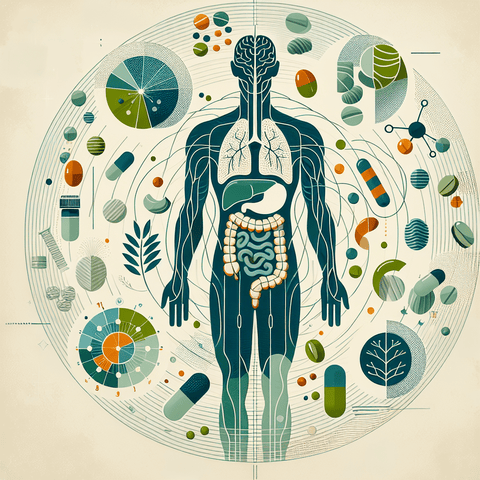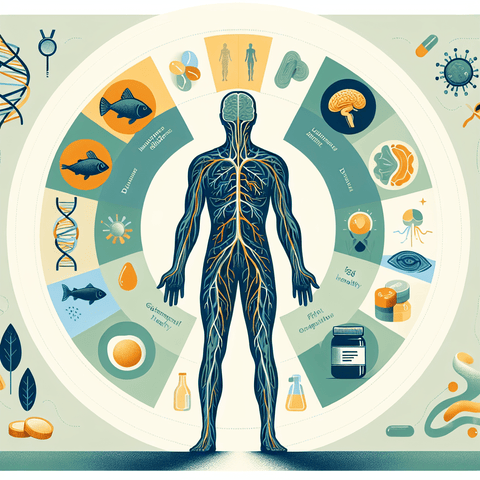Nutritional deficiencies are a silent epidemic. While their long-term effects are well-documented, some imbalances can affect the body astonishingly quickly—sometimes within just a few days. These rapid-onset deficiencies can result in immediate and highly noticeable symptoms, disrupting daily life and overall vitality. Whether caused by poor dietary choices, increases in metabolic demands, illness, or impaired absorption due to digestive issues, the body quickly signals distress when it lacks specific vitamins or minerals. Knowing which deficiencies manifest the fastest allows for quicker recognition, proper supplement intake, and potentially avoiding more serious health complications down the road. In this comprehensive blog post, we’ll explore which nutrient deficiency causes the most immediate symptoms, what signs to watch for, and how to address these imbalances through diet and supplementation. Understanding your body's nutrition needs is the first step toward achieving and maintaining optimal health.
1. Understanding Vitamin Deficiency: The First Clue to Nutritional Imbalances
A vitamin deficiency occurs when the body doesn't get enough of a particular vitamin needed for proper functioning. The causes vary—some individuals experience deficiencies due to unbalanced diets that lack variety or exclude entire food groups (like vegan diets lacking B12), while others may absorb nutrients poorly due to underlying digestive disorders. There are even cases where an individual has elevated nutrient needs due to illness, pregnancy, or intense physical activity.
Vitamins are classified as either water-soluble (such as B-complex and C) or fat-soluble (like A, D, E, and K). Water-soluble vitamins deplete more rapidly and are excreted quickly from the body, making them especially prone to fast deficiencies if they are not consistently replenished. In contrast, fat-soluble vitamins can be stored in fat tissues and the liver, although deficiencies might still develop with insufficient intake over time.
While deficiencies often develop over months or even years, certain nutrient shortfalls can have surprisingly fast effects. For example, Vitamin B1 (thiamine), Vitamin C, and magnesium can show pronounced symptoms within days or weeks of inadequate intake. These vitamins contribute to crucial functions such as neurological transmission, immune response, and energy metabolism. Because they are directly involved in energy production and cellular function, the body reacts strongly when levels fall too low, too quickly.
Identifying fast-onset symptoms is crucial for early intervention. If left unrecognized, these deficiencies can spiral into more severe health concerns such as neurological damage, immune system dysfunction, and chronic fatigue. Next, we will dive into which vitamin deficiencies are most acute and how quickly symptoms can set in, equipping you with the tools and knowledge necessary to respond appropriately.
2. Immediate Vitamin Imbalance: Recognizing the Fastest Onset Symptoms of Vitamin Deficiency
Immediate vitamin imbalances refer to deficiencies in vitamins that are not stored in large quantities in the body or are excreted rapidly. Once intake drops, these nutrients can become dangerously low in a matter of days. Among these, Vitamin B12, Vitamin C, and Vitamin D are often implicated in the fastest and most noticeable deficiency symptoms—each affecting the body in a distinct way.
Vitamin B12 plays an essential role in producing red blood cells and maintaining the nervous system. While its deficiency typically becomes symptomatic over months due to liver stores, in individuals who are already borderline deficient, neurological symptoms such as tingling hands, brain fog, and mood changes may appear within weeks if intake further drops. It's particularly crucial for vegans and vegetarians to monitor their B12 levels, as it’s primarily found in animal products.
Vitamin C is another critical player, known for its antioxidant properties and role in collagen synthesis. Since it’s water-soluble and rapidly excreted, even a few weeks of low intake can result in early signs such as fatigue, gum inflammation, and easy bruising—a precursor to scurvy. For individuals under stress or recovering from illness, requirements may increase, exacerbating the deficiency even faster. If you’re not regularly consuming fresh fruits and vegetables, supplementation may be required. You can explore Vitamin C supplements via the topvitamine.com Vitamin C assortment.
Vitamin D behaves differently. Although it is a fat-soluble vitamin, acute deficiency symptoms like muscle weakness, bone pain, and mood changes can appear relatively quickly in individuals with minimal sun exposure. This is especially relevant during the winter months or in cloudy climates. Its role in muscle function and immune defense makes it vital to detect and address promptly. To ensure adequate levels, consider exploring quality Vitamin D supplements on topvitamine.com’s Vitamin D page.
The timeframe for symptom emergence varies depending on current nutrient status, metabolic rate, and external circumstances such as illness or pregnancy. While Vitamin C depletion symptoms may appear in 2–4 weeks, the neurological signs of B12 deficiency could manifest in 4–6 weeks if the individual begins with low reserves. Prompt detection through blood tests and supplementation can revert symptoms quickly and prevent more serious consequences.
Recognizing early signs such as fatigue, depression, weakness, pale skin, or dental issues should prompt a reevaluation of your dietary pattern and potentially a visit to your healthcare provider for diagnostic testing. When it comes to nutrient balance, acting fast pays dividends in long-term wellness.
3. Sudden Nutrient Shortage: How Rapid Depletion of Essential Nutrients Impacts Your Body
A sudden nutrient shortage constitutes a rapid decline in levels of essential vitamins or minerals, leading to an equally rapid onset of symptoms. Unlike nutrient deficiencies that take months or years to develop, these acute shortages can arise in days due to illness, stress, medication interference, extreme physical exertion, or lack of dietary intake. Among the most commonly depleted nutrients in this category are magnesium, iron, and zinc—all three essential to vital bodily functions.
Magnesium regulates over 300 enzymatic reactions, including those responsible for muscle contractions, nerve impulses, heart rhythm, and stress responses. Individuals experiencing increased stress, poor sleep, or extensive physical activity can burn through magnesium stores surprisingly fast. Diuretics and heavy alcohol intake also deplete magnesium. Deficiency symptoms such as muscle cramps, irritability, fatigue, and restlessness can appear within just a few days. If you’re at risk, supplementation is strongly recommended—explore magnesium options at Topvitamine.
Iron is another key mineral that can cause rapid onset symptoms, especially in individuals with heavy menstrual cycles, internal bleeding, or chronic diseases. Short-term depletion may lead to fatigue, pale skin, shortness of breath, and dizziness. Iron is essential for carrying oxygen in the blood, and when levels fall rapidly, every cell in the body feels the oxygen shortfall. Women, endurance athletes, and vegetarians are at increased risk.
Zinc is intimately tied to the immune system, wound healing, and cellular regeneration. Acute zinc deficiency can result from gastrointestinal infections or restrictive diets. Symptoms may include sore throat, alterations in taste, hair loss, and slow healing wounds—all of which may occur within one to two weeks without sufficient zinc intake. Under inflammatory stress, your need for zinc increases markedly.
Clinical studies show that even marginal deficits in these minerals, especially magnesium, can interrupt nerve and muscle function. Hospitalized patients suffering from acute conditions rapidly deplete their mineral stores, emphasizing the speed with which these deficiencies can become dangerous. Thankfully, timely intervention with oral or intravenous supplements can restore balance quickly.
Monitoring nutrient status regularly and seeking supplementation during times of increased stress, illness, or physical strain can be a preventative measure against rapid depletion. Supplements tailored to meet your lifestyle needs are available at Topvitamine.com, making quality support accessible and effective.
4. Fast Deficiency Signs: The Key Indicators of Urgent Nutritional Gaps
When the body lacks essential nutrients, it often sends warning signals that prompt quick attention. Understanding these fast deficiency signs empowers individuals to act early and mitigate further health complications. These signs can appear as both physical and psychological disturbances—often mistaken for general fatigue or stress. However, when these symptoms persist or escalate, nutrient depletion may be the culprit.
Dizziness and lightheadedness commonly arise due to iron or vitamin B12 deficiency, as the body struggles to transport adequate oxygen to the brain. Hair loss and brittle nails are hallmarks of zinc, iron, and biotin deficiency. These changes are superficial but highlight deeper metabolic imbalances. Skin issues like dryness, rashes, or cracking at the corners of the mouth could be signs of deficiencies in vitamins A, C, B2, and B6.
Mood swings, depression, and anxiety often overlap with low B-vitamin status, particularly B12, B6, and folate. These vitamins support neurotransmitter synthesis and regulation, and a lack can destabilize mood quickly. Muscle twitches and spasms can be tied to an acute drop in magnesium or calcium. When these minerals are insufficient, nerve impulses misfire, causing uncomfortable muscular contractions or weakness.
Additionally, impaired immune function manifests quickly when intake of Vitamin C or zinc is insufficient. Recurring colds, prolonged infections, or slow wound healing should prompt evaluation. While many of these symptoms can manifest within one to two weeks of poor nutrient intake, they may intensify over time if left unaddressed.
If you’re experiencing any of these warning signs, it’s time to take stock of your health. Blood tests can confirm suspicions, and based on results, supplementation can restore nutritional status effectively. Many individuals benefit from targeted multivitamins that address underlying gaps. High-quality formulations are available through Topvitamine.com, where options tailored to immunity, energy, and stress resilience are readily accessible.
5. Acute Deficiency Symptoms, Rapid Mineral Depletion, and Their Impact on Health
Acute deficiencies go beyond mere inconvenience—they can cause significant dysfunction in a matter of days or weeks. In historical contexts, diseases like scurvy (Vitamin C deficiency) and pellagra (niacin deficiency) were common among populations with limited food variety, particularly sailors or those in poverty-stricken areas. Today, although these severe conditions are rare in developed countries, milder forms of malnutrition can still develop rapidly under the right (or wrong) conditions.
Cases of acute iron-deficiency anemia present with exhaustion, rapid heartbeat, and chest pain. When hemoglobin falls suddenly, the body acts fast to preserve essential functions, often at the expense of energy and focus. Another example, scurvy, can develop within a month in individuals lacking Vitamin C. Its symptoms—fragile blood vessels, bleeding gums, extreme fatigue, and joint pain—are profound and unpleasant but reversible with proper supplementation.
Meanwhile, acute magnesium depletion has been observed in hospitalized patients or athletes with excessive sweat loss. The result? Cardiac arrhythmias, mental confusion, and severe muscle cramps. Because the signs of mineral loss can escalate rapidly to serious consequences, preventive care and rapid intervention are crucial. Fortunately, magnesium supplements are widely accessible—check out Topvitamine’s magnesium collection.
When experiencing sudden changes in physical function or mood, the body may be alerting you to an acute nutritional gap. A swift return to homeostasis via diet and supplements is often the best course of action. From reducing inflammation to powering energy metabolism, nutrients play a front-line role in your body’s overall resilience and daily performance.
6. Strategies for Preventing and Addressing Rapid Nutrient Loss
Preventing rapid nutrient loss begins with dietary vigilance and awareness. A diversified diet rich in colorful fruits, leafy greens, lean proteins, whole grains, and healthy fats can help provide a wide spectrum of vitamins and minerals. However, modern lifestyles and food processing practices can sometimes make it difficult to meet these requirements consistently.
Supplementation can serve as an effective bridge. Not only does it help fill immediate gaps, but it also offers preventive support for high-risk groups like vegans, athletes, pregnant women, and the elderly. When choosing supplements, quality matters. The formulations should be bioavailable, third-party tested, and ideally tailored to your specific health goals. Topvitamine.com offers a curated selection of premium supplements—find your ideal combination from the pages for Vitamin C, Vitamin D, and Omega-3 DHA/EPA.
Routine check-ups including full blood panels are essential in detecting deficiencies early. Thanks to modern diagnostics, nutrient imbalances can be corrected before clinical symptoms occur. It’s also helpful to keep a food and symptom journal to identify patterns over time and improve diet quality.
Individuals dealing with chronic stress, digestive disorders, or high-intensity workouts may require more proactive strategies. These include choosing food-based supplements or targeted products focusing on stress resilience and digestive support. Customizing your plan based on lifestyle, age, and activity level will yield the best outcomes.
Ultimately, maintaining a nutritional baseline supports everything from physical energy to emotional stability. A few adjustments today can prevent serious deficiencies tomorrow.
7. Conclusion: Staying Ahead of the Fastest-Developing Nutritional Deficiencies
The body is quick to react when its nutritional needs aren't met—and just as quick to recover when supported correctly. Identifying fast-developing vitamin and mineral deficiencies is not only beneficial but essential for long-term vitality. Vitamins like C, B12, and D, and minerals such as magnesium and iron, are often the culprits behind sudden fatigue, mood issues, and decreased immunity. Recognizing the symptoms early and acting fast can prevent chronic complications and greatly enhance quality of life.
Preventative nutrition, educated supplementation, and personalized strategies go a long way in defending against sudden deficiencies. Consult with healthcare professionals regularly and consider integrating best-in-class nutrient products into your wellness routine to ensure comprehensive support.
Topvitamine.com offers a broad collection of vital supplements formulated for quick absorption and optimal results. Whether you're aiming to correct a micronutrient gap or proactively support your health, starting your journey with the right products makes all the difference.
Act now—your body will thank you later.
Q&A Section
Q: What is the fastest vitamin deficiency to manifest?
A: Vitamin C deficiency can manifest within 2–4 weeks, with symptoms like fatigue, bruising, and gum issues. Those with poor fruit and vegetable intake are especially at risk.
Q: Which mineral deficiency can occur rapidly and affect mood?
A: Magnesium deficiency can appear quickly and impact mood, causing agitation, irritability, or anxiety. It’s common in individuals under stress or high physical demand.
Q: How can I prevent nutrient deficiencies from developing so rapidly?
A: Eat a varied diet full of whole foods, take targeted supplements based on your needs, and get regular blood tests to monitor nutrient levels.
Q: Are supplements necessary if I eat healthily?
A: Even with a healthy diet, supplements can be useful to fill minor but impactful nutrient gaps, especially during times of increased demand or restricted eating.
Q: Where can I find quality supplements to address these deficiencies?
A: Visit Topvitamine.com for a wide selection of certified, high-quality vitamin and mineral supplements designed for optimal absorption and performance.
Important Keywords
- Fastest vitamin deficiency
- Rapid nutrient depletion
- Acute deficiency symptoms
- Magnesium deficiency signs
- Vitamin C deficiency onset
- Early signs of vitamin B12 deficiency
- High-quality supplements
- Preventing nutrient deficiency
- Topvitamine.com supplements
- Immediate nutrient imbalance



